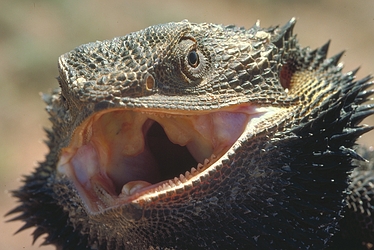10 Things Every Bearded Dragon Owner Should Know
The Ultimate Guide to Bearded Dragon Ownership
Are you considering bringing a bearded dragon into your life? Whether you’re a new pet owner or simply interested in learning more about these fascinating reptiles, this guide on bearded dragon ownership has everything you need to know to give your new pet the best care possible. From creating the perfect habitat to providing proper nutrition and veterinary care, read on to discover the top 10 things every bearded dragon owner should know.
1. Before Bringing Your Bearded Dragon Home
Before you bring your new pet home, make sure you have all the essentials. You’ll need a spacious enclosure, specific lighting and heating equipment, food and water dishes, substrate , and a hide box. Research and purchase these supplies beforehand to ensure your dragon’s comfort and health.
![[bearded-dragon-enclosure] [bearded-dragon-enclosure]](https://1.bp.blogspot.com/-8cwlxo0w6Gg/VzVk5lTrbVI/AAAAAAAAAME/T673hnpCPIU6jBvatkQ54NhflaXQPyM3gCK4B/s1600/Bearded%2BDragon%25E2%2580%2599s%2BEnclosure.jpg)
2. Creating the Perfect Habitat
Bearded dragons need a spacious environment with enough room to move around, from climbers to bask. The enclosure can be anywhere from 40 – 120 gallons; the bigger the better! The enclosure also needs to be outfitted with heating and lighting equipment that simulates the sun, to help organize the bearded dragon’s day/night cycle so they can understand when to be awake and when to rest. Ensure your Dragon has various basking spots and places to hide when feeling stressed, anxious, or overwhelmed.
![[bearded-dragon-habitat] [bearded-dragon-habitat]](https://2.bp.blogspot.com/-QMkMpnYN5B4/VzVeqEhCZLI/AAAAAAAAAJk/3d_QvyxslJYgDdD-sO0OQt421ASGhEpnACK4B/s1600/Bearded%2BDragon%2BAccessories.jpg)
3. Understanding Bearded Dragon Behavior
When raising a bearded dragon, it’s essential to know their behavior patterns in different situations. For example, bearded dragons use different body languages to communicate, from head bobbing to tail wagging. Understanding how your pet behaves can help you detect when they’re feeling stressed or happy and enjoy each other’s company even more.
4. Proper Nutrition
Bearded dragons are omnivorous and need a balanced diet of live prey and fresh vegetables/fruit. Their diet should include feeder insects like crickets, roaches, super worms, hornworms, etc. You can also feed them various fruits like apples and strawberries. However, avoid feeding them wild-caught insects as it may contain harmful parasites, chemicals, or pesticides.
5. Hydration is Key
Bearded dragons need fresh, clean water constantly available to them; avoid using tap water in areas with high chlorine content. Instead, it is best to use a water conditioner to clean water. Aside from their water bowl, they also need to receive hydration in their foods. You can also mist them daily to keep their skin hydrated.
6. Maintaining Proper Temperature
Bearded dragons are cold-blooded and require a consistent heating source; this source should be regulated to ensure the temperature stays between 95-110°F. Lighting equipment is also essential; UVB light is crucial for your Dragon as it helps digest calcium most effectively (essential for bone health).
![[bearded-dragon-temperature] [bearded-dragon-temperature]](https://1.bp.blogspot.com/-HIPL3yBNw2M/WytZlLW_BLI/AAAAAAAABFM/qMmfo0CE_aEHhFfMALDiOY_ugjelHOq5ACLcBGAs/s1600/7991699_orig.jpg)
7. Cleaning and Maintenance
Bearded Dragon’s enclosure needs to be cleaned frequently, and it’s best to spot clean each day to ensure hygiene is maintained. There are various substrates to choose from, and you need to read the instructions carefully to clean them effectively. Introduce a poop corner and sanitize it whenever necessary. . Ensure that their food and water dishes are clean and changed daily. Taking care of your dragon’s hygiene is essential to prevent illness.
![[bearded-dragon-cleaning] [bearded-dragon-cleaning]](http://1.bp.blogspot.com/-hRRDRzvvueM/TqvMTcmrzLI/AAAAAAAACOQ/GFie3NYCIOY/s1600/feeding-bearded-dragons.jpg)
8. Training Your Bearded Dragon
With time, love, and patience, your bearded dragon can learn different behavioral training techniques. From coming out of their enclosure to reacting to their name, spending time training your Dragon can be an excellent bonding experience. Ensure you don’t force or stress them while training and show them lots of love and affection while rewarding good behaviors.

9. Finding the Right Veterinarian
Bearded dragons need veterinary care to maintain good health. Finding an excellent reptile veterinarian can be challenging, but it’s essential to know where to find one, and having them pre-screened for added security. Ensure they are knowledgeable and trained with reptiles, and make sure that they are available in case of emergencies.
10. Enjoying Your Bearded Dragon
Last but not least, enjoy your new pet! Do some research and figure out what your Dragon might like to do, such as running around outside, swimming or cuddles. Taking time to bond and play with your bearded dragon can be an enjoyable experience and a great stress reliever. Enjoy watching them grow and learn with you along the way.
![[bearded-dragon-pet] [bearded-dragon-pet]](http://3.bp.blogspot.com/-KAJGRff0yLE/VN9LcLiSQyI/AAAAAAAAAHI/UdCNfleXvJ0/s1600/43e09d81-578f-43be-accd-c0310137b328.jpg)
Final Thoughts
Caring for a bearded dragon is a rewarding experience, and giving your pet the best care possible will ensure that they live a long and healthy life. Remember to do your research, prepare an adequate habitat designed for your bearded dragon’s needs and behavior, provide proper nutrition, and give them lots of love and attention. With time and the right care, your Bearded Dragon can quickly become one of your closest companions.
